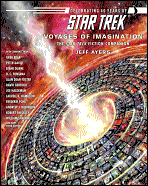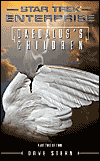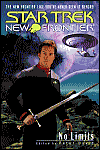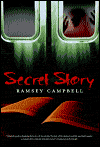
Voyages of Imagination, by Jeff Ayers
Book Review by David Roy
Have you read this book?
Being a Star Trek fan for a very long time, I've read a huge amount of Trek novels in my time. I was reading them back when they couldn't reference each other, so many of the books were cookie-cutter stories that had no relevance and often very little of interest. There were some stand-outs, of course. But did you know that Trek fiction has been around since the late 1960s? You would if you picked up Jeff Ayers' new book, Voyages of the Imagination: The Star Trek Fiction Companion. This huge book has it all. Every Trek novel ever published, every movie novelization, all of the James Blish episode novelizations. And yes, the very first Trek novel: Mission to Horatius (though granted, it's only included as the hardcover re-issue in 1999).
This is an incredible book for anybody with even a mild interest in Trek fiction. The book is a massive 782 pages, including index and timeline. Ayres tried to interview every author to get their thoughts on the books and the process of writing it. How did they come up with the idea? Were there any bumps in getting it approved? Did it change from outline to publication? Some of the authors wouldn't comment, some Ayres couldn't get in touch with. But there are a lot of authors' comments in here.
Not only is every book covered, but every story in every anthology as well. Thus, we get insights from all of the "Strange New Worlds" fan authors who received their first publications by that contest. That part is particularly neat because generally, Pocket Books only wants established authors doing their books, but the "Strange New Worlds" contest opened it up to everybody, so we get a lot of reactions from first time authors. Almost every one of them talks about how they came up with the idea for the story, but also how they found out that they had won. There's something to be said for the innocent enthusiasm of that first-time author getting their first story acceptance. It's contagious, that's for sure.
The book is divided into many different sections. The Blish novelizations are first, along with the other Bantam novels. Then the Ballantine novelizations of the animated episodes by Alan Dean Foster. From there, it goes on to Pocket Books and divides the chapters among the various series, both numbered novels and unnumbered novels. Finally, we get the miniseries (such as the Time's Enemy series), movie novelizations, original book series (such as New Frontier), anthologies, and finally the young adult books.
Basically, I loved the organization of the book. Everything's easy to find when it's divided by series like that, and if you can't find a particular book, the index is very helpful, listing both novels and authors. Each book entry has a brief plot blurb (usually about two or three sentences) and then goes into author comments. Some of these comments are long and some are short, and the first book for each author usually gives an overview of how the author came to Trek. I found this fascinating stuff, especially hearing the genesis of some of my favorite novels. It's even very cool that we get thoughts from Shatner and other actors who have written Trek books. We hear the definitive take on how Shatner's books are written, which should hopefully end all of the misguided assumptions out there in fandom.
You don't get a lot of "dish," though. Most of the controversies are mentioned but glossed over. You get the fact that there was some animosity at times, especially during the infamous "Richard Arnold" era which caused the novels to lose all of their continuity amongst themselves (he insisted that all Trek novels should be consistent with the series, but that they should not reference any other novels, and this was from Gene Roddenberry). Ayres gives Arnold a chance to defend himself too, which I found remarkably fair of him considering how much he's reviled throughout the novel-fan community. But we don't see any details about some of them. For instance, A.C. Crispin, when asked about any possible forthcoming Trek projects, states plainly "I will not be writing any more Trek books." We don't get anything else. I'm not holding this against Ayres because it's very likely they wouldn't have said any more, but it was disappointing not to get some of the gossip.
Another disappointment, again nothing against Ayres who did his best, is that some of the more prominent authors refused to comment. Vonda M. McIntyre refused to comment, so we didn't get any insights to the wonderful novelizations that she wrote or the reasons for why she stopped. John M. Ford also refused (possibly for health reasons, as he died shortly before this book came out), so we didn't get to hear about the writing process for "How Much for Just the Planet?", which I would have loved. Of course, there's no way Ayres could badger them into commenting, so I definitely list this under "disappointments" rather than "faults."
Finally, for those who like to follow Trek continuity to its fullest (and I know there are some of you out there), there is a complete timeline in the back of the book, incorporating every piece of Trek fiction as well as the shows and movies. Did you want to know what month and year the historical part of "City on the Edge of Forever" took place in? It's there. If a book covers a lot of different times, each piece is on the timeline somewhere. My only mild problem with the timeline, given that I'm not that into the continuity anyway, is that the "Strange New Worlds" stories are included. While I think they should be included in the book, I see the timeline as a way to keep track of the continuity the novels follow (for the most part), and "Strange New Worlds" stories are by definition outside of all of that.
If that's the only real fault I can find, though, you know this is an outstanding book. Voyages of the Imagination is the reference for both the Trek fan who wants to get started reading the novels or the fan who wants to keep track of everything that he/she has read. This is a wonderful addition to any Trek library.
This is an incredible book for anybody with even a mild interest in Trek fiction. The book is a massive 782 pages, including index and timeline. Ayres tried to interview every author to get their thoughts on the books and the process of writing it. How did they come up with the idea? Were there any bumps in getting it approved? Did it change from outline to publication? Some of the authors wouldn't comment, some Ayres couldn't get in touch with. But there are a lot of authors' comments in here.
Not only is every book covered, but every story in every anthology as well. Thus, we get insights from all of the "Strange New Worlds" fan authors who received their first publications by that contest. That part is particularly neat because generally, Pocket Books only wants established authors doing their books, but the "Strange New Worlds" contest opened it up to everybody, so we get a lot of reactions from first time authors. Almost every one of them talks about how they came up with the idea for the story, but also how they found out that they had won. There's something to be said for the innocent enthusiasm of that first-time author getting their first story acceptance. It's contagious, that's for sure.
The book is divided into many different sections. The Blish novelizations are first, along with the other Bantam novels. Then the Ballantine novelizations of the animated episodes by Alan Dean Foster. From there, it goes on to Pocket Books and divides the chapters among the various series, both numbered novels and unnumbered novels. Finally, we get the miniseries (such as the Time's Enemy series), movie novelizations, original book series (such as New Frontier), anthologies, and finally the young adult books.
Basically, I loved the organization of the book. Everything's easy to find when it's divided by series like that, and if you can't find a particular book, the index is very helpful, listing both novels and authors. Each book entry has a brief plot blurb (usually about two or three sentences) and then goes into author comments. Some of these comments are long and some are short, and the first book for each author usually gives an overview of how the author came to Trek. I found this fascinating stuff, especially hearing the genesis of some of my favorite novels. It's even very cool that we get thoughts from Shatner and other actors who have written Trek books. We hear the definitive take on how Shatner's books are written, which should hopefully end all of the misguided assumptions out there in fandom.
You don't get a lot of "dish," though. Most of the controversies are mentioned but glossed over. You get the fact that there was some animosity at times, especially during the infamous "Richard Arnold" era which caused the novels to lose all of their continuity amongst themselves (he insisted that all Trek novels should be consistent with the series, but that they should not reference any other novels, and this was from Gene Roddenberry). Ayres gives Arnold a chance to defend himself too, which I found remarkably fair of him considering how much he's reviled throughout the novel-fan community. But we don't see any details about some of them. For instance, A.C. Crispin, when asked about any possible forthcoming Trek projects, states plainly "I will not be writing any more Trek books." We don't get anything else. I'm not holding this against Ayres because it's very likely they wouldn't have said any more, but it was disappointing not to get some of the gossip.
Another disappointment, again nothing against Ayres who did his best, is that some of the more prominent authors refused to comment. Vonda M. McIntyre refused to comment, so we didn't get any insights to the wonderful novelizations that she wrote or the reasons for why she stopped. John M. Ford also refused (possibly for health reasons, as he died shortly before this book came out), so we didn't get to hear about the writing process for "How Much for Just the Planet?", which I would have loved. Of course, there's no way Ayres could badger them into commenting, so I definitely list this under "disappointments" rather than "faults."
Finally, for those who like to follow Trek continuity to its fullest (and I know there are some of you out there), there is a complete timeline in the back of the book, incorporating every piece of Trek fiction as well as the shows and movies. Did you want to know what month and year the historical part of "City on the Edge of Forever" took place in? It's there. If a book covers a lot of different times, each piece is on the timeline somewhere. My only mild problem with the timeline, given that I'm not that into the continuity anyway, is that the "Strange New Worlds" stories are included. While I think they should be included in the book, I see the timeline as a way to keep track of the continuity the novels follow (for the most part), and "Strange New Worlds" stories are by definition outside of all of that.
If that's the only real fault I can find, though, you know this is an outstanding book. Voyages of the Imagination is the reference for both the Trek fan who wants to get started reading the novels or the fan who wants to keep track of everything that he/she has read. This is a wonderful addition to any Trek library.
|
Click here to buy Voyages of Imagination, by Jeff Ayers on Amazon
|
Voyages of Imagination, by Jeff Ayers on Amazon

| More Books You Might Like |
Comment on Voyages of Imagination, by Jeff Ayers
| Comments on Voyages of Imagination, by Jeff Ayers |
| There are no comments on this book. |


